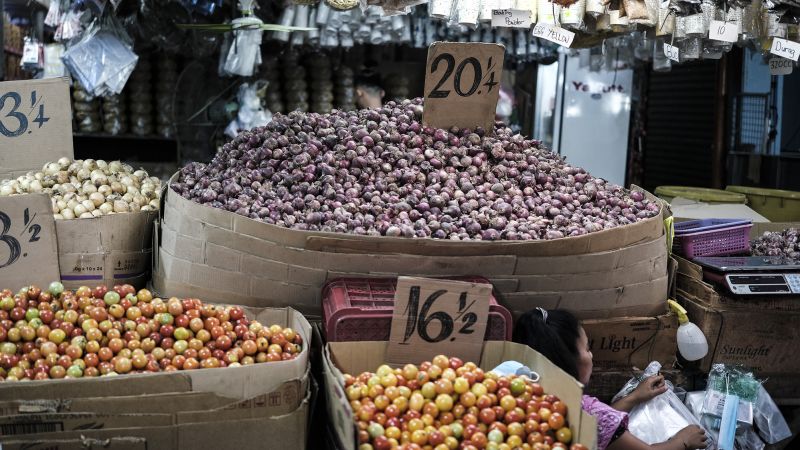Onions are so expensive in the Philippines they’re being smuggled into the country | CNN Business

Hong Kong
CNN
—
From salads to stews, the humble onion is a key ingredient in nearly every Filipino dish. But now, the vegetable costs almost three times more than chicken in the Philippines.
Red and white onions were selling for as much as 600 Philippine pesos ($11) per kilogram (2.2 lbs) on Monday, compared to 220 pesos ($4) per kilogram for chicken, according to the country’s Department of Agriculture.
Even beef brisket is 30% cheaper than onions by weight as the price of a kilogram of the allium has soared higher than the daily minimum wage.
Joey Salceda, resident economist at the Philippine House of Representatives, lamented Sunday that the country now has the “world’s most expensive domestic onion prices,” while Filipinos have flooded social media to complain about the sky-high prices.
The price surge comes after a spate of super typhoons hit the Philippines last year, damaging tens of billions of pesos worth of crops. The Southeast Asian country has been grappling with soaring inflation in recent months, with consumer prices jumping 8.1% in December, hitting a 14-year high, according to the Philippine Statistics Authority.
Record prices have prompted a number of official investigations, including by lawmakers and the country’s ombudsman.
Ombudsman Samuel Martires was quoted this week by CNN affiliate CNN Philippines as saying he was looking into the possibility of price manipulation. The ombudsman hasn’t yet replied to a CNN request for comment.
Onions have become such a hot commodity that they’re being smuggled into the country.
Customs officers seized $310,000 worth of white onions concealed in a clothing shipment in their latest bust on December 23, according to the state-run Philippine News Agency. Two days earlier, $364,000 worth of red onions from China found hidden in pastry boxes were also seized by Customs.
Senator Sherwin “Win” Gatchalian has called for the creation of a task force to tackle smuggling.
“Smuggling adversely affects the economy not just in terms of revenue loss for the government because of uncollected tariffs and duties. Smuggling also destroys the market dynamics of local products,” he said in a Tuesday statement. “We need strong enforcement of existing laws to effectively address this issue and protect local producers.”
Rex Estoperez, assistant secretary at the Department of Agriculture, told CNN on Tuesday the government had been trying to crack down on smugglers, but the problem has persisted.
President Ferdinand Marcos Jr. said he hoped to find a way to sell the smuggled onions to “reduce the supply problems” the country was facing.
President Marcos, who is also the secretary of agriculture, approved the import of 21,060 metric tons of onions this week, with the shipment expected to arrive by January 27, according to CNN Philippines.
“One of the drivers of inflation in the country is the rising prices of onions, so we have decided to recommend the importation of onions,” Estoperez told CNN, adding that Filipinos consume around 20,000 metric tons of the vegetable every month.
The imports were a “temporary solution,” he said, adding there were no further plans for purchases because the peak harvest season comes in February, which may bring prices back down.
Nicholas Mapa, a senior economist for ING Bank based in the Philippines, said importing onions was already too little too late as prices have already shot up so much.
“In the near term, we can only hope to mitigate price pressures with increased supply either through importation or … local harvest. We are getting a harvest in the first quarter so hopefully that should help alleviate the situation,” he said, adding that the industry should improve storage to limit wastage during typhoons.
For all the latest world News Click Here

